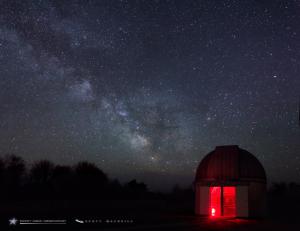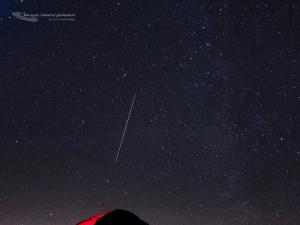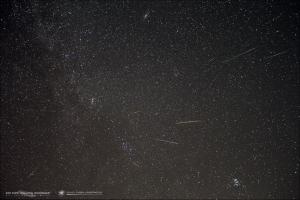
Public Stargazing
- Where:
- Frosty Drew Observatory
- When:
- Friday April 17, 2015 at 8:00 p.m.
- Cost:
- $1 Suggested Donation per Person
Though rain and clouds are happening today, the skies should start to clear just in time for our Stargazing event. Tonight's forecast is calling for clearing skies between 4:00 p.m. and 10:00 p.m. with clear skies prevailing by midnight. This is awesome news as we have had four Fridays in a row slammed with rain, clouds, fog, and wind. Additionally, the New Moon is happening tomorrow, giving us super dark, moon-free skies all night tonight. Though the forecast for the earlier part of the night is quite variable, we should be able to rock out in full astro-geek style tonight.
We plan to open the Observatory and Sky Theatre at 8:00 p.m. In the Observatory, if departing clouds permit, we will begin our session with views of Venus' fabulous waning gibbous phase and Jupiter sporting all four Galilean Moons. As the night progresses and skies further clear, we will showcase numerous galaxies in our telescopes eventually arriving at Saturn around 11:00 p.m. The Sky Theatre will be showing a slide show of astrophotos shot at Frosty Drew and possibly live telescope views if weather conditions permit.
Overall, the weather will give us a slow start, though we should move to full out rock star mode as skies clear. The lack of a bright Moon coupled with the dense number of galaxies visible to our telescope make for an amazing spring night to be out at Frosty Drew Observatory. Following @FrostyDrewOBSY on Twitter or Facebook will get you occasional updates from the observatory to help you make an informed decision on when to come out. Hey, grab those binoculars, telescopes, or just some friends and family; then make your way out to the best skies for stargazing in Rhode Island and connect with your inner astro-geek at Frosty Drew Observatory tonight!
-------------------------------------------------------------------------
Weekly Happenings
Scott MacNeill
During the early morning hours of Wednesday, April 22nd and Thursday, April 23rd the peak of the annual Lyrid Meteor Shower will taking place. Add in that the thin crescent Moon will set early in the evening on both nights and we are setup for perfect meteor watching conditions. Since this coming week (April 20 – 24) is also spring break for all Rhode Island public schools and many schools in Connecticut and Massachusetts, awesome opportunities await to catch a glimpse of a few shooting stars.
The Lyrid shower is one of the oldest recorded meteor showers, with recorded observations dating back to the year -686. Like most meteor showers, the Lyrids originate from the debris field left behind by a comet. In this case the comet responsible for the Lyrid shower is comet C/1861 G1 Thatcher, which was discovered on April 5, 1861. Unlike some of the more known meteor showers of the year, the Lyrids only produce around 10-20 meteors per hour, though outbursts of 100 meteors per hour do happen and are difficult to predict. Lyrid meteors move fast, are bright, and are known to leave behind dust trails that are visible for several seconds after the meteors disperse.
Observing the meteor shower will be pie. Grab a reclining lawn chair or a blanket and lay on your back with your feet pointed towards the northeast. Comfortably look at the sky in front of you to spot passing meteors. Lyrid meteors will appear to radiate from a point just to the right of Vega, the super bright star in the constellation Lyra. If skies stay clear, we could be in for stunning views. Frosty Drew astronomers will be onsite for the Lyrid peak after midnight. So stop in, setup your spot, and catch a glimpse of the fabulous starscape with the occasional shooting star compliments of the Lyrids.
This Wednesday, April 22nd, is Earth Day 2015 and NASA is running the #NoPlaceLikeHome campaign calling on you to post photographs to social media of your favorite place on planet Earth. Use the hash tag #NoPlaceLikeHome to take part in the global celebrations. After which, NASA will compile a video of the best shots posted throughout the day. Check out the NASA event on Facebook and Google+, then get out there this Wednesday and celebrate the only home we have ever known
-Scott



